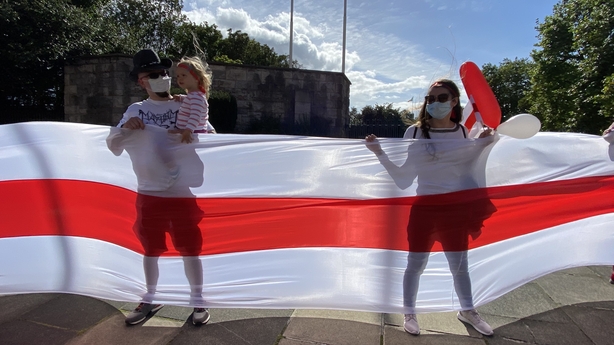Not everyone agrees with their family, especially when it comes to politics. Having the freedom for heated exchanges across dining room tables is the bedrock of a democracy.
Despite differences, these debates can end with an exhausted, eyebrow-raising "pass the mash".
But for Katia Lysionak, she is fighting to make that healthy sparring a reality.
"My family is actually divided, which is okay right? People are entitled to their opinion. That’s what we are hoping to see, a country where a range of opinions can be expressed, can be heard and can be discussed," she said.
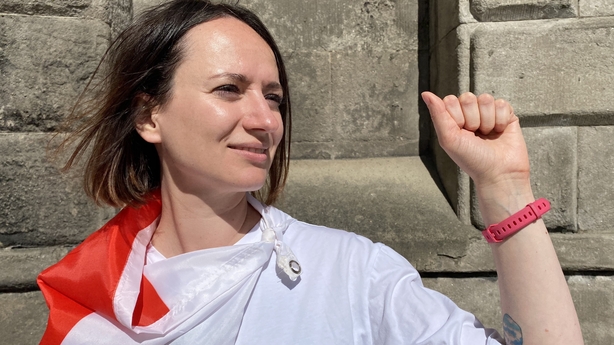
The Belarusian woman, who has lived in Ireland for the past five years, has become part of an opposition movement against President of Belarus Alexander Lukashenko after his disputed re-election this month.
However, her parents "passionately" back the man who has been in power for 26 years.
"They believe I am contributing to the unrest, that I am contributing to the nationalist ideas to divide the society further," said Katia, who has been organising demonstrations against him and his government in Dublin.
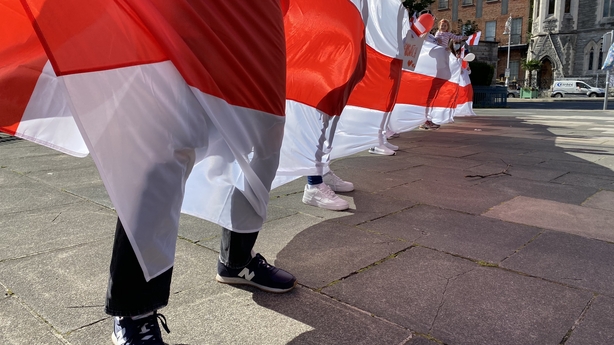
There has been a warning from her mother and father too: do not come home any time soon.
"I've asked them do they think it is safe for me to come back right now and visit them. And as much as they are pro-government, they admitted they would not advise me to come back and visit any time soon. They themselves don’t believe I would be safe crossing the border and visiting," she added.
With a Belarusian flag draping from her neck, Katia is one of the 'Women in White', female peaceful demonstrators holding flowers and dressed in red and white, demanding political change in Belarus while slamming a violent crackdown on protesters.
Their appearance is a stark contrast to the black, bulletproof vest uniforms worn by 65-year-old Alexander Lukashenko as he brandishes assault rifles, describing those against him as 'rats' and 'sheep' who are influenced by foreign powers.
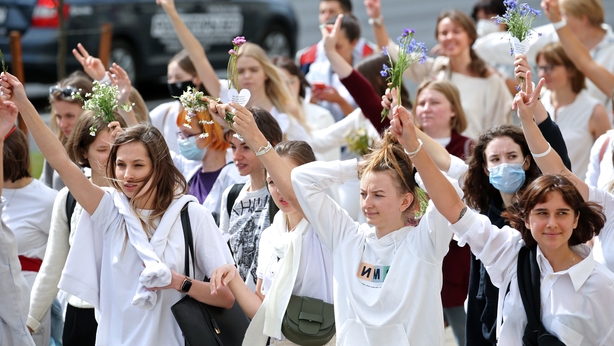
Women have become a symbol of the opposition movement in Belarus, not only on the streets but in the higher echelons.
It all started as the presidential election got under way this summer in Belarus when male opposers to Mr Lukashenko were arrested and blocked from the race.
One of them was popular YouTube blogger Sergei Tikhanovsky, who tried to register as a candidate but was detained.
With an honesty about having no prior political experience, Svetlana Tikhanovskaya took her husband's place hoping to highlight his situation.
However, the former English teacher’s candidacy took on a new meaning, drawing crowds of supporters not seen in decades.
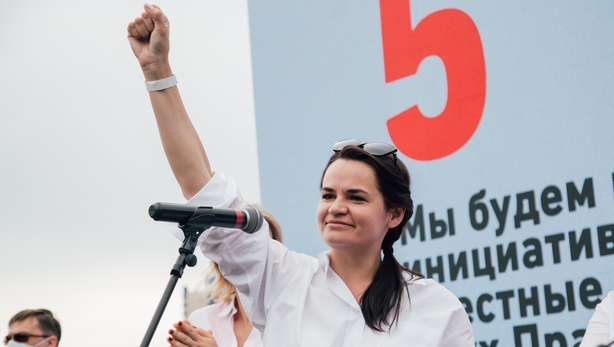
Among her backers were two other disqualified opposition candidates; Viktor Babaryko and Valery Tsepkalo. Mr Barbarkyo's campaign manager Maria Kolesnikova and Mr Tsepkalo's wife Veronika also joined the movement, assisting Ms Tikhanovskaya with her bid.
The trio became an unexpected force against Mr Lukashenko, something he dismissed because of their gender.
"Our constitution is not for women. Our society has not matured enough to vote for a woman. This is because by constitution the president handles a lot of power," he said at the time.
Katia Glod, non-resident fellow at the Centre for European Policy Analysis, said underestimating the power of women was Mr Lukashenko's "biggest mistake", in particular not taking Svetlana Tikhanovskaya seriously.
"They did not realise she was going to be such a strong impressive candidate, that she would manage to rally support from many layers of society, that she would be such a symbol, that she would be so direct and such a great communicator as she has proven to be," she said.
As the election intensified, so did the threats against the women. Ms Tikhanovskaya sent her children, with their grandmother, out of the country for protection.
Gender aside, the other surprising element was the forming of an opposition coalition, previously known for clashing with each other.
"For the first time, very quickly, we saw a whole spectrum of opposition united and there were women at the forefront. That’s definitely what authorities did not expect before," said Ms Glod.
As the election intensified, so did the threats against the women. Ms Tikhanovskaya sent her children, with their grandmother, out of the country for protection.
During the election cycle in July, Amnesty International also reported that women were being targeted by authorities in ‘gender-specific’ ways in the run up to the election.
"Some examples include authorities’ threats to take these women’s children into state custody, or threats of sexual violence against them" a report from the human rights organisation stated in July.
On the day of polling, Veronika Tsepkalo fled Belarus.
The results of the election would give 80% of the vote to Mr Lukashenko, figures which were condemned by EU and US. Both described the election as neither free nor fair with the European Union threatening to impose tough sanctions over allegations of vote rigging.
Ms Tikhanovskaya was the next to leave the country, travelling to Lithuania after being briefly detained. She later explained that she made the "very difficult decision" to leave because of her children.
Demanding change and fresh elections, tens of thousands of people took to the streets in Belarus. It soon turned into chaos.
At least two protesters have died and thousands have been jailed, many emerging from detention complaining of being beating and abused. Several strikes at state-owned factories have also been held over the treatment of protesters.
Peaceful demonstrations, in adherence with Covid-19 guidelines, have been taking place in Dublin too.
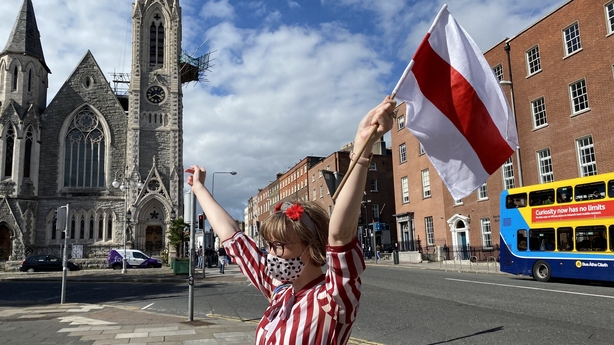
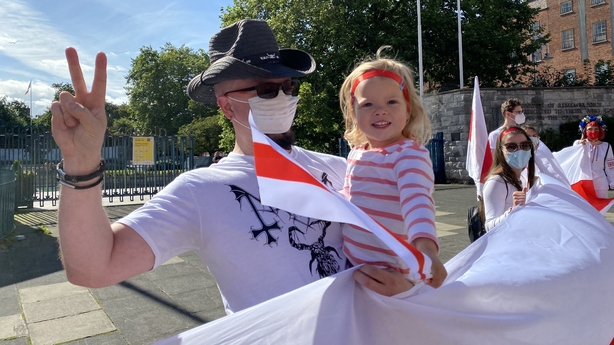
At one of them this week, Belarusian Art Balenok held his daughter Anna and said he "cannot sleep" with everything happening at the moment.
Mr Balenok, who has been in Ireland for 18 years, said he doesn’t feel safe travelling to his place of birth at the moment, but looks forward to the day he can bring his daughter back for a visit.
"But not right now," he added.
There in solidarity, too, was Moscow native Olga Kiseleva.
"I was born in May 1994 and Lukashenko was elected as president of Belarus in July 1994 and since then I haven’t seen any other Belarus President ... It’s hard to watch from here," she said.
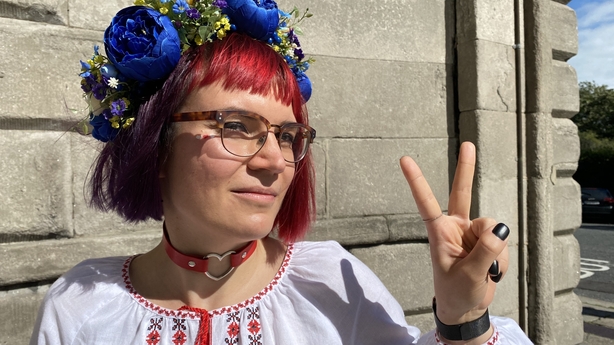
Ms Kiseleva said women are underestimated in her culture but with thanks to the online world, their voices are starting to be heard with the platforms giving a powerful tool for women to become role models.
In Belarus, Maria Kolesnikova is the only one of the trio to remain in Belarus, and continues to campaign for free and fair elections, telling the media that she is not going anywhere.
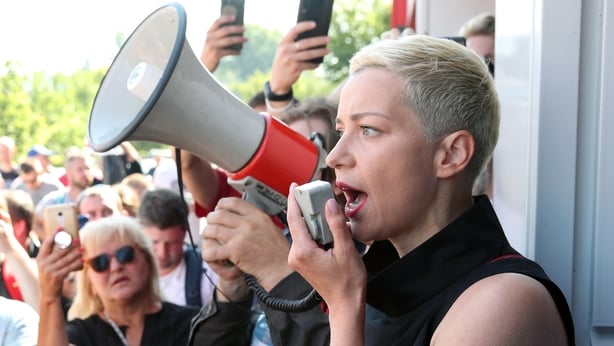
Arrests have also been made of two other leaders, Olga Kovalkova and Sarhei Dyleuski, who has led strikes at the Minsk Tractor Factory.
The duo are heads of the opposition Coordination Council, which was set up last week with the stated aim of opening negotiations with the government.
The Coordination Council includes female figures from many sections of society, including Svetlana Alexievich, winner of the Nobel Prize for Literature who was also questioned over the group.
Mr Lukashenko said the council is an illegal attempt to seize power and prosecutors have launched a criminal case against it.
What the future holds for the country is uncertain said Katia Glod, as Mr Lukashenko is not a politician who usually "makes concessions or compromises".
Ms Glod, who got back from Belarus on Wednesday, said that protesters are now coming to the realisation that their movement is going to be a marathon and not a sprint.
For Katia Lysionak, she hopes that some day authorities in Belarus will listen to the protesters, the country's neighbours and the wider world about going into dialogue.
However, she sighs as she tries to assess how long that will take.
"I am hopeful. Is it realistic? I don't know," she said.
